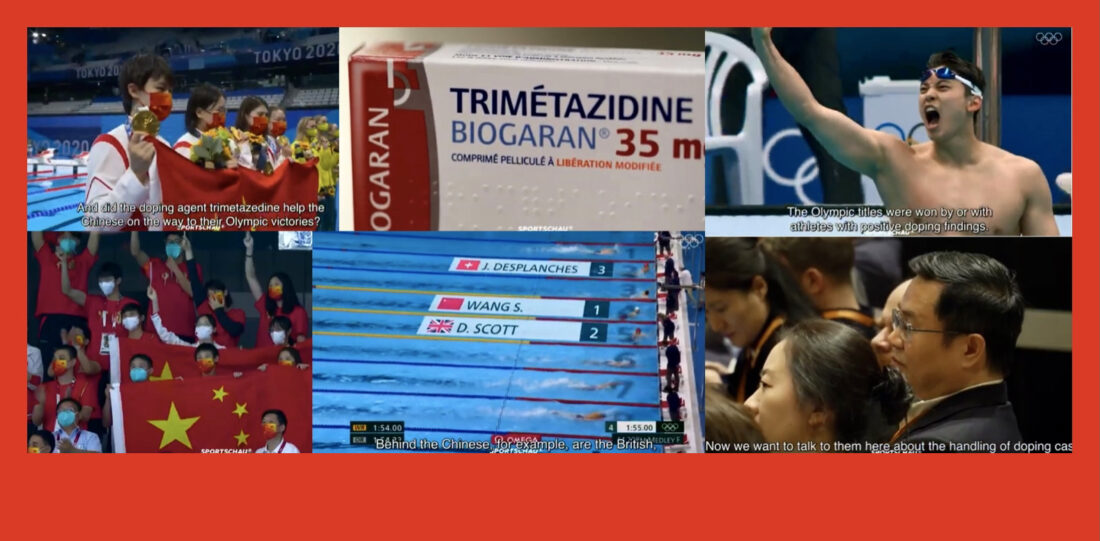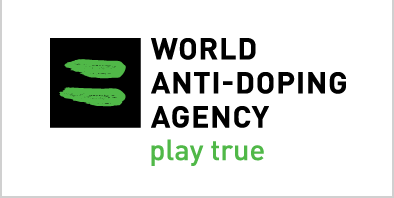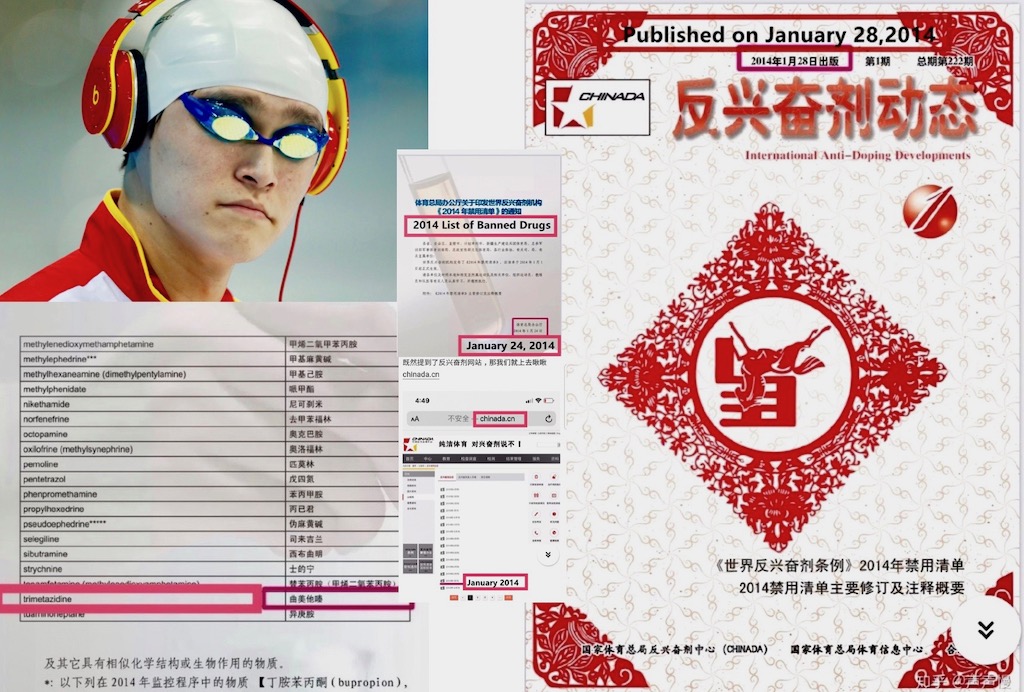Doping Board ‘Bypassed’ In FINA Review Of China 23-Go-Free Cases; Lessons Learned, Says Regulator

Anti-doping experts serving on swimming’s Doping Control Review Board were not given the chance to review the 23 positive drug tests by Chinese swimmers before the then Fina (since rebranded World Aquatics) cleared them, notes an exclusive report in The Times.
With a little over a month to go before the Olympic Games would get underway in Tokyo three years ago and at a time of transition for old FINA management to a new team led by Brent Nowicki, who arrived as the new director in June 2021, the Chinada report sent to Wada earlier that month arrived at aquatics HQ in Lausanne.
That report and its acceptance by Wada and FINA is now the subject of an investigation due to report next month.
Nowicki had arrived in the job from his former role as Court of Arbitration Counsel, among his last roles at the clean-sport gatekeeper taking on Fina and Sun Yang* in a case that ended in the Chinese controversy being landed a suspension of four years and three months.
The American lawyer inherited a situation that had been handled by his predecessor in the top management seat at FINA, Cornel Marculescu. Although China had known about the positive tests since early January 2021, it was late June before FINA was given the details of why Chinada had closed the 23 cases with no penalty nor investigation involving independent oversight from international anti-doping experts and investigators.
Wada accepted the word of Chinese state security agents that mass contamination for the banned substance trimetazidine (TMZ) at a team hotel had accounted for the 23 positive tests. The burden of proof required to mount a reasonable challenge at the Court of Arbitration for Sport (CAS) could not be met, Wada believed. It had no access to China at the time because of restrictions of movement related to the Covid pandemic.
A late review began at FINA because the federation (later rebranded World Aquatics in a reform process) needed to inform Wada whether it thought there were grounds for accepting the evidence of a “mass contamination” event or whether there were grounds for disagreeing with China’s decision to declare the whole episode a “no fault” moment for all the athletes because any challenge to the CAS would be “highly unlikely” to succeed.
FINA could there have handed the matter over for review by the Doping Control Review Board, which brought together scientific, doping and legal expertise and opinion. However, the review was handed to the chair, Dr. Jordi Segura without reference to the rest of the review board.
Objections Within FINA Doping Review Board
At least one long-standing member of that board has confirmed that he objects to having been excluded from the 2021 review described by Wada as “thorough”. The Board has since shift-shaped into a new unit under the auspices of the Aquatics Integrity Unit.
A new five-person committee, including two members of the Integrity Unit, was announced to federations at the start of this month (see May 8 in The Vortex), sparking more objection from experts who feel they would have had more to contribute to an “audit” process sparked by the China cases, that some of those asked to serve.
Nowicki, confirms to The Times that Dr. Segura was the scientific expert asked to review the Chinada file, while FINA also sought legal opinion from outside counsel. He defends the position. FINA took in June 2021 under prevailing circumstances but says: “While we are confident in the decisions that were made back in 2021, everything always looks different with the benefit of hindsight. We’ve already identified ways in which we could maybe have done better.”
Read the full report at our exclusive in The Times – Chinese swimmers were cleared after review from only one person – (by Matt Lawton and Craig Lord)
A Case Of “Damned If You Do, Damned If You Don’t”?
Nowicki also believes Wada faced a Hobson’s Choice of “damned if you do, damned if you don’t”. The regulator had a binary choice, Nowicki telling me: “They could have gone to CAS with 23 separate appeals arguing that there was a violation while maintaining a “no fault” position because there was simply no evidence other than what led to the conclusion that this was a mass contamination event. Or, we know we have an impossible burden of proof on appeal so we don’t appeal it because we know we can’t win it.”

The WADA Code’s rule 3.1, “Proof of Doping”, states: “The Anti-Doping Organization shall have the burden of establishing that an anti-doping rule violation has occurred. The standard of proof shall be whether the Anti-Doping Organization has established an anti-doping rule violation to the comfortable satisfaction of the hearing panel, bearing in mind the seriousness of the allegation which is made. This standard of proof in all cases is greater than a mere balance of probability but less than proof beyond a reasonable doubt.”
The Code also “places the burden of proof upon the Athlete or other Person … to rebut a presumption or establish specified facts or circumstances … the standard of proof shall be by a balance of probability.”
Before it called an ‘independent’ investigation last month, Wada revealed in defence of its decision on the Chinese 23 that there were “many” other cases of multiple positives that were judged to have been caused by contamination and were, therefore, never made public.
Nonetheless, there’s a widespread perception among anti-doping agencies, experts, athletes, coaches and others in Olympic sport that attempts were made to conceal circumstances of the Chinese positives that test the WADA Code’s insistence of equal treatment for all signatories.
The Code insists: “… it is critical for purposes of harmonization that all Signatories base their decisions on the same list of anti-doping rule violations, the same burdens of proof and impose the same Consequences for the same anti-doping rule violations. These rules must be the same whether a hearing takes place before an International Federation, at the national level or before the Court of Arbitration for Sport.”

Critics believe that China has long been given the benefit of the doubt, the leniency shown to Sun in 2014 on the word of Chinada when the swimmer tested positive for the same substance, TMZ, at the heart of the current controversy.
In the current case, the word of Chinada is the word of Chinese state security agents who provided all direct evidence for the alleged mass contamination in a hotel kitchen more than two months after the swimmers had stayed there during the January 1-4 competition at which they tested positive for TMZ.
When The Times asked if Wada at its media conference last month f it could truly trust what it had been told by the state Ministry of Public Security in China, Wada Counsel Ross Wenzel said: “As a lawyer, I can say that we didn’t have any evidence that there’d been anything untoward that had gone on. If what’s underlying the question is a thesis that this might have been planted in the kitchen and then that gave rise to the detection … we didn’t have any evidence of that.”
He concluded: “I’m very confident that if we’d have gone to the CAS with all of the five or six elements that I’ve already mentioned, that already suggested contamination as opposed to deliberate ingestion, coupled with detection in the hotel kitchen, and in the absence of any evidence of any sort of any sort of misconduct of the kind you may be alluding to, I’m very confident that we would have had close to a zero percent chance of succeeding in establishing that the athletes had not met their burden of to show the origin of the … substance on the balance of probabilities.”
The New China Crisis – SOS Coverage
ARD’s “Doping Top Secret – The China Files” – Parts 1-4 – Watch Why WADA U-Turn Is Urgent
SOS Analysis
The ARD China Files: Part 1 – SOS Analysis: Spies, Spice & Mass Contamination
The ARD China Files: Part 2 – SOS Analysis: On The Trail Of An Existential Precedent?
The ARD China Files: Part 3 – SOS Analysis: Lab Trials For TMZ & Testing Timeframes
SOS Related Coverage
Sport Integrity Australia Backs USADA Call For WADA Review Of China’s Go-Free 23 Positives
Chinada Says It Has Worked With “Zero-Tolerance” Attitude Towards Doping
USADA Calls For Independent Prosecutor & Overhaul of WADA In New China Crisis
WADA In Staunch Defence Of Decision Not To Challenge 28 Positives In 23 Chinese Swimmers
Sunday Essay: Caution: Olympic Hotel Contamination May Contain Trimetazidine? We’d Be Nuts To Think So
New China Crisis As ARD Reveals That 23 Swimmers, Zhang, Wang & Qin On The List, Tested Positive For Sun’s 1st-Offence Drug